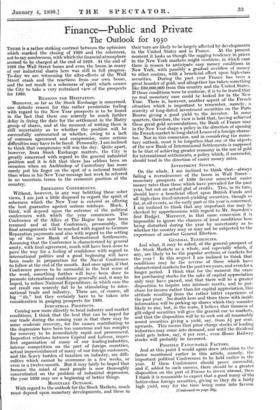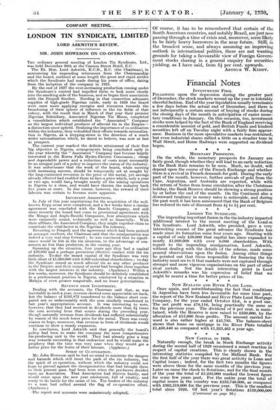Finance Public and Private
The Outlook for 1930
THERE is a rather striking contrast between the optimism which marked the closing of 1929 and the soberness, not to say sombreness, with which the financial atmosphere seemed to be charged at the end of 1929. At the end of 1928 the Wall Street boom and even the boom in many of our industrial shares here was still in full progress. To-day we are witnessing the after-effects of the Wall Street crash and the reactions from our own boom, and the net result is a soberness of spirit which causes the City to take a very restrained view of the prospects for 1980.
REASONS FOR HESITATION.
Moreover, so far as the Stock Exchange is concerned, one definite reason for this rather pessimistic feeling with regard to the New Year prospects is to be found in the fact that there can scarcely be much further delay in fixing the date for the settlement in the Hatry group of shares, and at the moment of writing there is still uncertainty as to whether the position will be successfully surmounted or whether, owing to a lack of common agreement and compromise, some serious difficulties may have to be faced. Personally, I am inclined to think that compromise will win the day. Quite apart, however, from Stock Exchange matters, the City is greatly concerned with regard to the general industrial position and it is felt that there has seldom been an occasion when an Archbishop of Canterbury has more surely put his finger on the spot of a national trouble than when in his New Year message last week he referred in no uncertain terms to the economic position of the country.
IMPENDING CONFERENCES.
Without, however, in any way belittling these sober views, I am just a little disposed to regard the spirit of soberness which the New Year is entered as offering the best guarantee against serious mishaps. Much, I think, will depend upon the outcome of the political conferences with which the year commences. The Conference of the Allies at The Hague has now been resumed and at that Conference, presumably, the final arrangements will be reached with regard to German Reparation payments and also with regard to the setting up of the new Bank of International Settlements. Assuming that the Conference is characterized by general amity, with final agreement, much will have been done to pave the way for a feeling of confidence with regard to international politics and a good beginning will have been made in preparation for the Naval Conference to follow at the end of the month. And once again, if that Conference proves to be successful in the best sense of the word, something further will have been done to promote international confidence generally and, it may be hoped, to reduce National Expenditure, in which case the net result can scarcely fail to be stimulating to inter- national trade and industry. These are, of course, all big "ifs," but they certainly have to be taken into consideration in gauging prospects for 1930.
INDUSTRIAL PROSPECTS.
Coming now more directly to local industry and market Conditions, I think that the best that can be hoped for our trade during the coming year is that there may be some moderate recovery, for the causes contributing to the depression have been too numerous and too complex for recovery to be immediately rapid and pronounced. Imperfect relations between Capital and Labour, imper- fect organization of many of our leading industries, intense competition on the part of foreign countries, actual impoverishment of many of our foreign customers, and the heavy burden of taxation on industry, are diffi- culties which cannot be overcome in a few weeks, or even in a twelve-month. But it may fairly be hoped that because the mind of most. people is now thoroughly concentrated on the problem of industrial depression, the year 1930 may see a beginning of better things.
MONETARY OUTLOOK.
With regard to the outlook for the Stock Markets, much must depend upon monetary developments, and these in their turn are likely to be largely affected by developments in the United States and in France. At the present moment it looks as though the sagging tendency in prices In the New York markets might continue, in which case there is reason to anticipate easy money conditions in New York, with possibly a gradual overflow of money to other centres, with a beneficial effect upon high-class securities. During the past year France has been a great hoarder of gold, and altogether has taken something like £80,000,000 from this country and the United States. If those conditions were to continue, it is to be feared that no real monetary ease could be looked for in the New Year. There is, however, another aspect of the French situation which is important to remember, namely, a scarcity of long-dated investment securities on the Paris Bourse giving a good yield to the investor. In some quarters, therefore, the view is held that, having achieved these great gold accumulations, the Bank of France may in the New Year shape a policy in the direction of opening the French market to long-dated Loans of a foreign charac- ter. Nor in this connexion, and in considering the mone- tary outlook, must it be forgotten that one of the objects of the new Bank of International Settlements is supposed to be that of achieving greater economy in the use of gold for international settlements, a policy which, if successful, should tend in the direction of easier money rates.
INVESTMENT STOCKS.
On the whole, I am inclined to think that—always failing a recrudescence of the boom in Wall Street— monetary prospects of 1930 favour somewhat easier money rates than those which have prevailed for the past year, but not an actual glut of credits. This, in its turn, should have a beneficial effect upon British Funds and all high-class fixed-interest-yielding securities, though so far, at all events, as the early part of the year is concerned, I am inclined to think that any important rise may be checked by apprehensions with regard to Mr. Snowden's first Budget. Moreover, in that same connexion it is impossible to ignore the chances of local conditions here being disturbed during the year by uncertainty as to whether the country may or may not be subjected to the experience of another General Election.
GENERAL TENDENCIES.
And what, it may be asked, of the general prospect of the Stock Markets as a whole, and especially which, if any, are likely to be the popular sections of markets for the year ? In this respect I am inclined to think that conditions may be the reverse of those which have characterized markets for the past two years, and even for a longer period. I think that for the moment the craze for purchasing stocks for the sake of capital appreciation only may have passed, and that there will be a greater disposition to inquire into intrinsic merits, and to pur- chase for income rather than for capital appreciation, this attitude resulting from the rather bitter experience of the past year. No doubt here and there those with inside information will be picking up shares which they consider likely to rise, but, in the main, I believe that firmness of gilt-edged securities will give the general cue to markets, and that the disposition will be to seek out all reasonably sound securities giving a yield, say, from 5i per cent. upwards. This means that prior charge stocks of leading industries may come into demand, and until the dividend yield gets below, say, 6 per cent., even Home Railway stocks will probably be favoured.
POSSIBLE FAVOURABLE FACTORS.
And at this point I would again draw attention to the factor mentioned earlier in this article, namely, the important political Conferences to be held earlier in the year. If these Conferences should prove successful, and if, added to such success, there should be a greater disposition on the part of France to invest abroad, then I think it is reasonable to expect that a good many of the better-class foreign securities, giving as they do a fairly high yield, may for the time being come into favous, . (Continued on page 34). Of course, it has to be remembered that certain of the South American countries, and notably Brazil, are just now passilig-through a time of crisis and, moreover, seen likely to be fairly heavy borrowers in the near future. -Still, in the broadest sense, and always assuming an improving outlook in international politics, there are not wanting grounds for taking a favourable view of Foreign Govern- ment stocks sharing in a general enquiry for securities yielding, as I have said, from 5i per cent. upwards.. .
ARTHUR W. KIDDY.











































 Previous page
Previous page